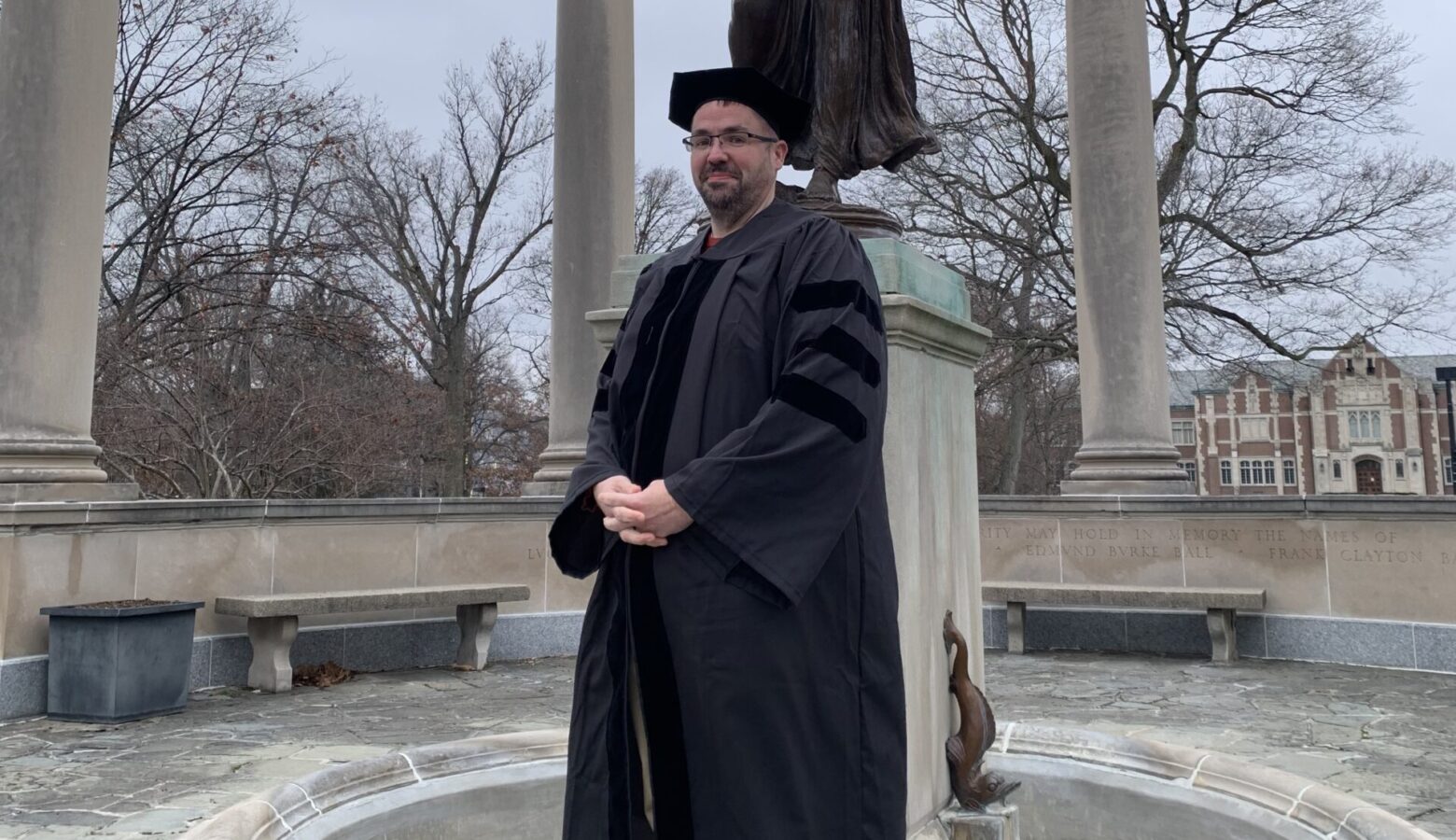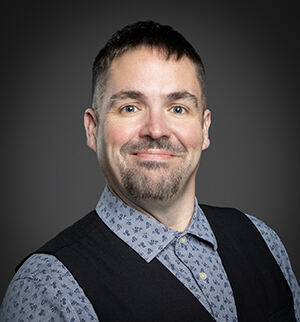From GED to EdD: Brandon Million beats the odds and graduates with a doctorate from Ball State

Tooting paper horns coupled with jingling slot machines can signal a dynamic, colorful entry to a bright new year.
But the sounds are off putting to Brandon Million, reminding him of a time in his life that was static and dull.
“I think about that night all the time, all the time,” said Million.
Million was working at a casino outside of Indianapolis. It had been a 14-hour shift by the time that old year turned to new, and he was suddenly struck by the journey he found himself on.
After dropping out of high school, then finishing a GED, Million was working hourly wage jobs in a small community that didn’t offer much by way of big dreams.
But New Year’s Eve 2009, Brandon looked out at the casino floor from his workspace behind the bar, and decided he’d had enough.
“There was just something that twinged inside of me and I just said, ‘I deserve to be out there celebrating New Year’s.’ I had worked in retail, I had worked in restaurants, I had worked in nursing homes, I had worked in a factory. And every single one of those jobs, I had to work holidays.
“Everybody was celebrating … And I’m like, ‘This is the last time I’m ever going to do this. I’m not going to spend another New Year’s Eve watching other people celebrate, because I have to work.’ That was the day I decided that I was going to enroll in Ivy Tech.”
That decision was the first in a process that saw him complete an associate then bachelor’s degree, and now Million stands ready to complete his doctorate in higher ed administration from Ball State.
He said the obvious joke — his one in a million chance to go from GED to EdD — nevertheless accurately reflects his path.
“Statistically, it’s accurate. You know, being poor, being a non-traditional student, being first generation, having different cognitive disabilities, being neurodivergent… being openly queer. Those are all things that are statistically telling me I shouldn’t be at the spot that I am at now.
“So yeah, it is kind of like being one in a million.”
Million is quick to point to people along the way that helped him beat the odds.
Melinda Messineo, professor of sociology at Ball State, met Million when the two were attending the same conference. Messineo learned more about Million’s background, and his plans for his future, and she encouraged him to give Ball State a look.
“He chose Ball State and how he describes the choice is because he felt seen, and he felt that relationships mattered,” Messineo said.
She explained Million quickly became part of the fabric of the university, completing his master’s degree in sociology, beginning his doctoral work, and landing a job as the assistant director of the Office of Inclusive Excellence.
It was there that he joined the committee that helped write and implement the university’s Inclusive Excellence Plan, and where he began working with Marsha McGriff, the former associate vice president for inclusive excellence at Ball State.
McGriff said the team crafting the university’s inclusivity plan were all heavily invested in the work.
“We knew we were embarking on a seminal moment for the university, and we approached it with the level of respect required,” McGriff said.
Million was McGriff’s researcher, and she said at one point the committee had more than two dozen different models from places around the country that were part of the committee’s review process.
“Brandon became invaluable to me in that process,” McGriff said.
She added that once the formal plan was completed, it was Million who figured out a way to help communicate it to the larger university community.
“That guy helped to put together a companion piece, because you can’t put out a strategic plan without giving people a roadmap for how to accomplish these goals. The roadmap was an inclusive excellence toolkit. When we put the plan out, people would have an immediate reference tool to build inclusive excellence in their own spaces.”
The team worked untold hours, McGriff said, and became a close-knit group. She said Million’s personal story helped inform the work.
“His particular life journey gave us the multi-faceted depth of information we needed to bring about the right strategies to build the bridges to inclusive excellence,” McGriff said. “You can look at data, but to have a person who is living and embodying the work — it was powerful and unprecedented.”
Million said his experience was informed by people like Messineo, McGriff and others who encouraged his every step.
“I couldn’t have made it this far without the people in my life that believed in me,” Million said. “I never would have made it without them because they didn’t let me quit when I wanted to. There were days I was ready to say, ‘Sorry, forget this,’ and walk away and they wouldn’t let me. Having those people in my corner, that even when I doubted myself, they didn’t doubt me, means everything in the world.”
Now, he’s working to return that encouragement to his students, and others he encounters along the way.
“I share a lot of my story whenever I do presentations or speak in public, because you know somebody could hear that and think, ‘Oh this is possible,’” Million said.
Regardless of a family’s connection to education or other challenges students face, he said he hopes he can provide a light.
“I want people to believe this is possible. Don’t let anybody tell you that you can’t do it. Don’t let anybody tell you you’re not smart enough, or that you don’t have the ability. Because if you just persist enough, there’s not much you can’t do.”
Brandon Million serves on the Ball State Public Media DEIAB committee.
Lisa Renze is Director of Unified Media in the Department of Journalism. She spent the bulk of her career as a journalist with newspapers and magazines around the Midwest, including a decade with the Indianapolis Star. Contact her at lrenze@bsu.edu.


